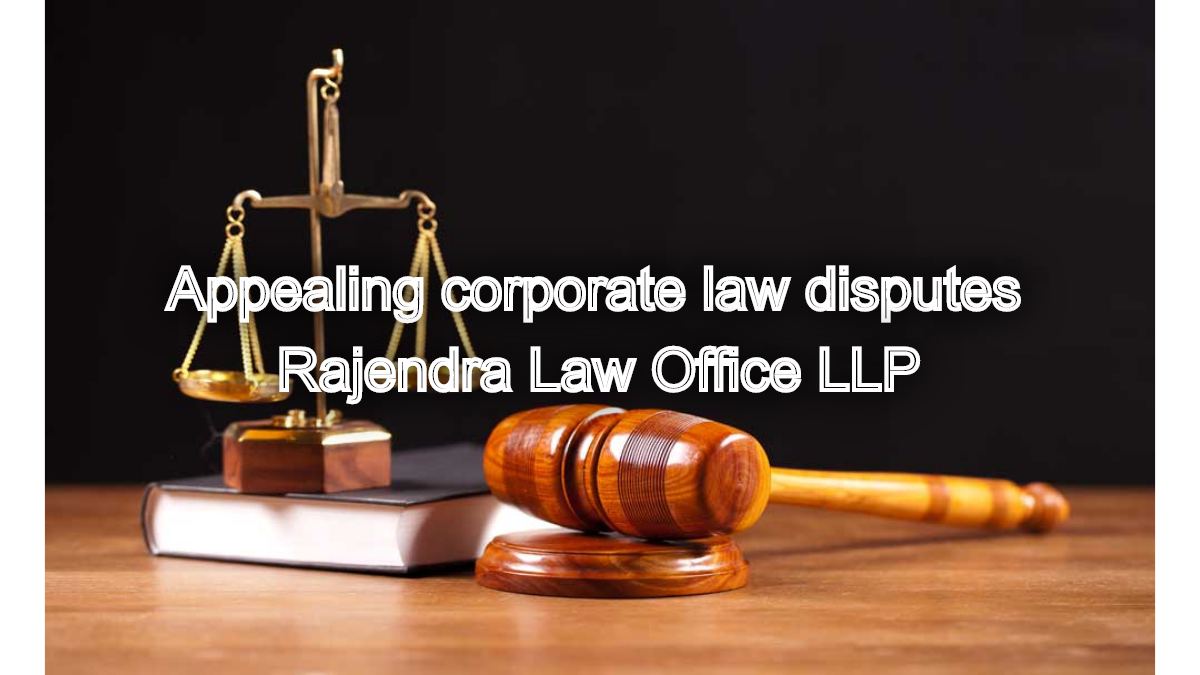Corporate Law Appeals: Corporate law, a complex and ever-evolving field, often involves intricate disputes that can have far-reaching consequences for businesses. When a corporate law dispute doesn’t yield the desired outcome at the trial court level, appealing the decision becomes a crucial step. A successful appeal requires a deep understanding of procedural rules, legal principles, and persuasive advocacy.
Corporate Law Appeals: Appealing Corporate Law Disputes: Rajendra Law Office LLP
The Importance of Appellate Advocacy
Appellate advocacy is a specialized practice that demands a keen eye for detail and a strong grasp of legal nuances. A skilled appellate attorney can:
- Identify Errors: Scrutinize the trial court’s decision for errors of law or fact.
- Craft Persuasive Arguments: Develop compelling arguments to convince the appellate court to reverse or modify the lower court’s ruling.
- Prepare Effective Briefs: Prepare well-crafted briefs that clearly articulate the legal issues and present persuasive arguments.
- Represent Clients in Oral Arguments: Effectively present oral arguments before the appellate court, addressing the court’s questions and concerns.
Rajendra Law Office LLP: Your Trusted Legal Partner
Rajendra Law Office LLP is a leading law firm in Chennai with a strong track record in handling complex corporate law appeals. Their team of experienced attorneys possesses a deep understanding of corporate law principles and appellate procedures. They are committed to providing exceptional legal services to their clients and have a proven ability to achieve favorable outcomes.
The Appellate Process
The appellate process typically involves the following steps:
- Notice of Appeal: The first step is to file a notice of appeal within a specified timeframe.
- Record on Appeal: The appellate court will review the record of the trial court proceedings, including transcripts, exhibits, and briefs.
- Appellant’s Brief: The appellant’s attorney prepares a brief outlining the legal errors made by the trial court and the reasons for reversal or modification.
- Appellee’s Brief: The appellee’s attorney files a brief responding to the appellant’s arguments and defending the trial court’s decision.
- Reply Brief: The appellant may file a reply brief to address any new arguments raised by the appellee.
- Oral Arguments: In some cases, the appellate court may schedule oral arguments, where attorneys present their arguments to the judges.
- Decision: The appellate court issues a written decision, which may affirm, reverse, or modify the trial court’s judgment.
Key Considerations for a Successful Appeal
To increase the chances of a successful appeal, it is crucial to:
- Identify Strong Grounds for Appeal: Focus on clear legal errors or procedural irregularities that can be challenged.
- Timely Filing: Ensure that all deadlines for filing appeals and briefs are strictly adhered to.
- Strong Legal Argumentation: Present well-reasoned arguments supported by relevant legal authorities.
- Effective Communication: Maintain clear and effective communication with the appellate court.
- Experienced Legal Representation: Engage the services of a skilled appellate attorney to navigate the complex process.
FAQs: Corporate Law Appeals
An appeal is a legal process where a party who is dissatisfied with a lower court’s decision can request a higher court to review and potentially overturn the decision.
You should consider appealing a decision if you believe there were significant legal errors made by the trial court, or if the decision is unjust or unfair.
The key steps in the appellate process include filing a notice of appeal, preparing briefs, oral arguments (if applicable), and waiting for the appellate court’s decision.
An experienced appellate attorney can identify potential grounds for appeal, draft persuasive briefs, effectively argue your case before the appellate court, and increase your chances of a favorable outcome.
The costs of an appeal can include attorney fees, court filing fees, and other expenses. Additionally, there’s always a risk that the appellate court may affirm the lower court’s decision. However, the potential benefits of a successful appeal, such as avoiding significant financial losses or adverse legal consequences, often outweigh the costs and risks.
Conclusion
Appealing a corporate law dispute can be a complex and challenging process. However, with the right legal guidance and a strong understanding of appellate procedures, it is possible to achieve a favorable outcome. By choosing a reputable law firm like Rajendra Law Office LLP, you can increase your chances of success and protect your business interests.
Read More
- GST Appellate Tribunal: How to find the Best Senior Attorneys?
- Constitutional Bench Appeals: Appealing before a Constitutional Bench
- Consumer Protection Appeals: Appealing consumer rights decisions
- Appeals in Civil Rights Cases: Appealing civil rights violations cases
- Appeals in Tax Matters: Challenging tax-related decisions in SC
- Ministry of Corporate Affairs:

